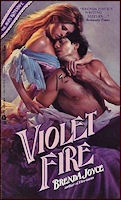ORDER IT
Amazon
Barnes & Noble
IndieBound
Published: May 1989
A scion of the imperious Bragg family, golden-boy Rathe Bragg finds a society party all rather a yawn until a feisty suffragette bursts into the room. Wielding a six-shooter and shrieking feminist slogans from atop the grand piano, the impassioned lady makes a startling first impression on those gathered, especially Rathe — and from that moment the sparks between them only intensify.
Irrepressible Grace O’Rourke, an intensely devout feminist, has outraged the entire town of Natchez with her radical ideas, and soon infuriates Rathe with her lack of regard for any opinions other than her own. Yet, despite her steadfast devotion to her cause, Grace warms to the virile gallant. But his bold suggestion of becoming his mistress stings the proud Grace, and she firmly rejects his scandalous proposition. But telling a Bragg “no” is the ultimate stimulant, and now, Rathe ardently pursues the lady whose eyes are ignited by a violet fire.
Winner of Affaire de Couer’s Gold Certificate for Excellence 1989
REVIEWS
“Steamy sensuality…action…emotional power…plus unforgettable characters and scenes that pull at your heart strings, makes VIOLET FIRE one great read.”
—RT Bookreviews
“VIOLET FIRE is wonderful…Brenda Joyce not only depicts poignat historical issues but she does so with a touch of humor that is totally delightful.”
—Affaire de Coeur
SNEAK PEAK
Mississippi 1875
Grace O’Rourke sat perfectly erect, shoulders stiff and squared, gloved hands clasped primly in her lap. She looked out from beneath a gray bonnet at the passing countryside—green and lush and so very hot in August. They had passed through rolling, wooded hills and small cultivated plots of land, by vast fields of cotton, shimmering white in the sun, ragged shacks with sagging roofs and huge, partially destroyed antebellum mansions, with blackened-out windows, a testimony to the recent past. The train was already chugging its way across Mississippi. In a very few hours she would arrive at her destination. Unconsciously, her hands tightened.
She made a nondescript figure in her dowdy gray travelling suit. There was a light dusting of freckles over her perfectly small, slightly upturned, classically Irish nose. A pair of gold-rimmed spectacles also rested on that nose, but could no disguise wide, almond-shaped eyes of the most remarkable color—violet. Her mouth was lush and full, especially when relaxed and not primly purses in thought or vexation. The hat hid every single strand of her fantastically red hair, a near impossible accomplishment, for it was a hip-length mass of untameable curls. Her eyebrows, arched above the ugly glasses, were a darker auburn, almost but not quite the exact same shade as her hair.
Grace was very anxious. She was terribly afraid that something might go wrong, that she might lose the job she traveling to Natchez to claim. A very proper appearance was crucial. Her suit, however unflattering, was her best and that, along with the glasses, which she did not need, and the bonnet concealing her hair, made her look, she thought properly matronly. Properly governess-like she hoped. “Oh darn,” she finally whispered to herself, releasing some of the anxiety that had been building in her over the last few days.
The couple sitting in front of her turned to stare.
Grace smiled immediately, ignoring the man, whose red face and veined nose bespoke intemperance to her discerning eye. The woman was plump and sad-eyed, a sister in need—Grace could just feel it. They had boarded in Nashville. Grace had been waiting for the right opportunity to strike up a conversation. “It’s such a shame,” she said softly, gesturing at the still magnificent ruins of yet another antebellum plantation.
“Yes it is,” the woman responded, twisting to look at her.
“I’m Grace O’Rourke, from New York City,” Grace said, smiling and extending her hand. She felt a twinge of worry about using her real name, even though it was unlikely anyone would recognise her so far from home.
“I’m Martha Grimes, and this is my husband Charles.”
Charles turned too, after taking a sip from a beautifully wrought silver hip flask. “My pleasure, ma’am.”
Grace nodded and turned her attention back to Martha. “Where are you from, Martha?”
“You wouldn’t know it—a little town called Two Corners, fifty miles south of Nashville.”
“No, I don’t know it. What brings you and your husband south?”
“We’re visiting our daughter in Natchez,” Martha said, beaming. “She’s just had her first.”
“How wonderful. I’m on my way to Natchez, too. I’m a teacher.”
Charles turned. “Hope you ain’t one of them nigger teachers.”
Grace stiffened, flushing. Do not respond, she told herself sternly. Do not. She ignored him. “Actually, a dear, old friend of mine has arranged a position for me at a plantation called Melrose. As governess.”
“How wonderful.” Martha said. “How many children will you have?”
“Just two,” Grace said, with a deep sigh. She was so unbelievably lucky to have gotten this position. The pay was more than generous, and it included room and board. She would be able to send all of her income back home to help out her sick mother. And she would not have to augment her salary with part-time employment, the way she had done in New York.
Once she had been a New York City public school teacher, but she hadn’t worked in ten months—ever since she had been arrested.
Grace was the daughter of abolitionists. Her father, Sian O’Rourke, was an easygoing Irish doctor who had died in the Civil War, accidentally shot while trying to ten to the wounded in the midst of battle. He and her mother, Dianna, had been active participants in the Underground Railroad and the American Anti-Slavery Society. Her mother had begun to question the role of women in society as early as the forties. With Sian’s full support, she had attended the first convention for women’s rights in Seneca Falls, New York, in 48, and had been lecturing and organizing ever since. After the War and her husband’s death, she had turned all her attention to the women’s suffrage movement, first as a member of the American Equal Rights Association, and when that divided into two camps, the radical National Women’s Suffrage Association.
It was only natural that Grace should join the cause from the time she was an adolescent. As a child she had heard many heated debates between her parents and their friends. Sometimes she had sat on her father’s warm lap, held close to his chest, while he smoked a pipe, the fervent conversation echoing around the kitchen as the abolitionists and women agitators met and planned. Sian was as quiet as her mother was volatile—he had always teased her that her hair and her temper had most definitely not come from his side of the family. But when he did speak, never raising his voice, everyone stopped to listen. Those were wonderful exciting times.
They lived in a small apartment in the city, with just the one bedroom for her parents. Grace had slept on a cot in the kitchen. Both Sian and Dianna gave her her lessons, and Grace was reading avidly by the age of six—anything she could get her hands on. There were always plenty of pamphlets around. Sian was proud of his daughter’s ability, and both of her parents always had time to answer her questions.
Sian rarely had cash, though. Most of his patients were too poor to offer any payment other than a few eggs or a home-cooked meal. Dianna was an excellent seamstress, and through her efforts, kept food on the table. Grace learned to stitch at an early age, although she hated it; she preferred her books to all else, but was expected to help her mother—and she did.
She knew as a youngster that she wanted to be a schoolteacher. At first, her father was surprised. “Are you sure, Grace?”
”Da, look how you and Mum have taught me. Imagine if I’d grown up in one of those fancy mansions on the river. I’d be some simpering idiot, now wouldn’t I?”
Sian smiled.
“But you taught me to think, you made sure my eyes were open to the world, to all its injustices. How can the slaves ever be freed, how can women ever escape male tyrant, if children aren’t taught to think, to question what they see and hear and are told?”
Sian wrapped her in his warm, familiar embrace. “I’m proud of you, Grace.” She was only twelve.
She was going to teach children to think for themselves, as her parents had taught her. It became the family mission to scrape together the money she needed for school. It was no easy task, especially when the War began, and her father died. At fourteen Grace took employment as a maid for the extra income. Even during school she worked part-time, went to class, studied, and found time to work alongside her mother in the National Woman’s Suffrage Association.
In ’66, at the age of eighteen, she had attended the National Women’s Rights Convention with her mother—her first one. It was an exhilarating experience, one that left her flushed with excitement for days. She had attended many more since. There had never been any question that she would follow in her parents’ footsteps organizing and agitating and teaching others in order to correct the injustices of the world.
She was twenty-three when she finally attained her teaching certificate.
Now Grace grazed absently out the train’s window. Ten months ago she had lost her teaching job. A proprietor of a men’s haberdashery had had her arrested for disturbing the peace. It had not been her first arrest. Two years ago she and five other women had been arrested for trying to register to vote amidst shocked males and dismayed confused election officials. All charges had been dropped as the country had turned to watch the spectacular trial of Susan B. Anthony for exactly the same offence. She had been found guilty of violating the voting laws and fined, but she had resolutely refused to pay. To this day she was successfully avoiding payment.
It still made Grace furious whenever she thought about her own last arrest. It wasn’t fair. Yes, she had hit the man, but he had grabbed her in a most intimate place—and damned if she wouldn’t hit him again if she has the chance! She had succeeded in sending most of his customers fleeing from the store, outside of which two woman were handing out pamphlets inviting the men to attend a women’s suffrage meeting especially for their edification and enlightenment. Fortunately, she had only been fined and had managed to borrow the money to pay. But it was too late; the damage was done. The city’s Superintendent of Public Schools had dismissed her. Her career as New York City schoolteacher was over.
To make matters worse, during the past two years Grace had watched her mother grow paler, thinner, and more fanatical. She worried that her mother was pushing herself too hard. Six months ago the fatal blow had fallen—her mother had been diagnosed as having tuberculosis.
Grace had been desperate for a job. Her mother needed special care that only the city’s finest hospitals could provide. And in New York she was now notorious as a crazy women’s rights agitator, thanks to the headlines she had made during her last arrest. Not only had she lost her public school position, but as she soon discovered, no private schools would hire her. She had not even been able to find a position as a tutor. No one would hire her—not even for a clerical position.
“Are you married, dear?” Martha asked, interrupting her thoughts.
Grace thought of her dear friend, Allen Kennedy. “No.” She could read Martha’s thoughts as if they were spoken aloud feel her pity. The poor thing, Martha was thinking, she’s a spinster.
Grace’s lips tightened into a narrow line. She hated that word, spinster. It was the most unfair, chauvinistic word, and a perfect example of the tyranny of the male sex over women. And she could be married if she wanted to be. Allen had asked her twice.
Allen.
Dear Allen had come to her rescue, and Grace clutched her reticule with his letter in it closer to her bosom. Allen was also a schoolteacher. They had meet three years ago during a citywide meeting of the National. The guest lecturer had been Victoria Woodhull, and Grace had been the first to raise her hand during the question-and-answer session afterward. She had been angry, although she hadn’t let it show. The Woodhull’s, Grace fervently believed, had irreparably damaged the women’s movement by advocating free love. It had alienated to many potential followers. Instead of asking Victoria a question, Grace had used the opportunity to call her to account for sidetracking the movement. Later, Allen had sought Grace out. He not only agreed with the inexpedience of advocating free love, but like herself, he was against it morally as well. They had had a long and exhilarating talk and had become fast friends.
Allen had left New York last year, before the fiasco of her last arrest, having taken a position in one of Mississippi’s new public schools, teaching children of newly freed slaves. He had asked her to marry him for the second time just before he left, but Grace had refused. Although she loved Allen and had the utmost respect for him, she had no desire to marry him, even though he was the most enlightened man a woman could hope to find. Allen did not understand, and Grace really didn’t either. She tried to tell him, and herself, that she just had no interest in marrying.
She sighed, then caught sight of Martha Grimes again. Why linger over the past, she told herself, when a willing subject presented herself?
“May I join you, Martha?” she said, pointing toward the place Charles Grimes had just vacated.
Martha agreed happily and Grace slipped into the seat beside her, digging into her reticule and pulling out a pamphlet. “Do you like to read?” She asked her face flushed now, her eyes sparkling.
“Of course,” Martha said, but Grace had already handed her the papers. “This includes the text of a wonderful speech by Elizabeth Cady Stanton,” Grace cried enthusiastically. “On marriage. On divorce.”
Martha stared and Grace held her gaze. “You know,” Grace said in a hushed, tense voice, “when men enter into a partnership, if it’s not mutually beneficial, it’s an accepted, indeed, expected practice for them to dissolve that partnership and go their separate ways.”
Martha bit her lip, clutching the papers to her plump breast.
Grace drove on. “Why is it that only we woman suffer to endure? When a child attains a certain age, his subjection to his parent’s authority is dissolved. Why is it a wife’s subjection is eternal? Did you know that in some countries widows are burned on the funeral pyre with their dead husbands?”
Martha’s eyes widened.
“Why is it,” Grace said, her voice rising, causing heads to turn, “that women are doomed to servitude for their entire lives?”
“I don’t know,” Martha whispered weakly.
Grace gripped her arm. “Martha, I will be forming a local women’s organization in Natchez, if one isn’t in existence already. Please, come and hear us. Just hear us. I want to help you.” She removed her spectacles, which were slipping off of her nose from her excitement, to stare intently into Martha’s eyes.
“I couldn’t,” Martha managed. “Charles…”
“I’ll let you know when our first meeting will be.” Grace said, squeezing her hand, “We’re all in this together, Martha. All of us.”


